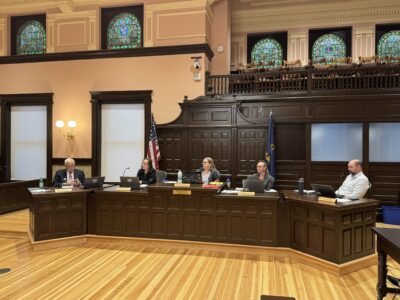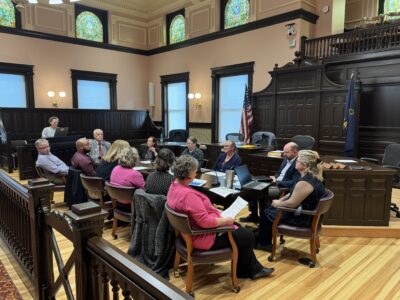Mental health court test run, funding needs discussed at Douglas County Commission work session

The Douglas County commission meets in the historic courtroom on the second floor of the old county courthouse, 1100 Massachusetts St.
Work on a proposed county mental health court has progressed to the point that it already has been tested with a trial run, Douglas County commissioners were told at a Wednesday work session on the topic.
What was learned from that first case was the need for communication and creative thinking among the many agencies involved with the court and the level of services that need to be available to make it work, Douglas County District Attorney Charles Branson told commissioners.
“We’ve already learned from the first case that this is very complicated,” he said. “We had issues with medication monitoring, housing and transportation.”
Commissioners were informed of broad concerns with the test case, but were told that the specific details of the case could not be discussed for privacy reasons.
Before the County Commission next week will be a $443,000 funding request to create a mental health court. Among its line items will be additional personnel and services needed to address those issues Branson mentioned and others identified at the work session.
Although county commissioners signaled at the end of the hourlong work session a willingness to fund a mental health court in the 2017 budget, Wednesday’s discussion was focused on the nuts and bolts of the program rather than the dollars needed to pay for it.
The test case was the result of a more than yearlong effort to develop the mental health court, commissioners were told.
The goal of the mental health court is to give courts flexibility in finding appropriate placement for those in the Douglas County Jail primarily because of underlying mental health issues, said Jason Matejkowski, a professor with the Kansas University School of Social Welfare, who serves as a consultant in the county’s review of its criminal justice system. To be eligible for the program, defendants must have been arrested for low-level offenses and pose no risk to public safety.
Branson said diversions could be offered before charges were filed, after that action was taken or even after sentencing.
Mental health courts differ from normal dockets in that there is no one taking an adversarial role toward defendants, Matejkowski explained. The process seeks to encourage the defendant to engage in treatment to address the mental health conditions that led to the person’s arrest. A key difference from other courts was the active role judges take in directing and monitoring a defendant’s treatment, he said.
Often times, a defendant was not aware of treatment options, dropped off medication or couldn’t afford treatments that were available, Matejkowski said. The leverage to get them to participate in the program was the chance to get out of jail and avoid penalties associated with the offenses for which they were arrested. Successful treatment will lead to no charges being filed in the case of prearrangement diversions, dropping charges for those offered post-arrangement diversions and expunging records for diversions offered after sentencing.
Another difference in mental health courts and regular dockets is the level of the judge’s involvement in the case management of defendants, Matejkowski said. The judge, who would be Douglas County District Sally Pokorny, is directly involved in overseeing the development of a treatment plan for defendants and in monitoring progress, he said. Defendants could report to the judge as often as once a week early in the process, which typically lasts from 12 to 18 months, he said. Courts average about 30 active clients, he said.
Complicating the process and treatment plans is the number of other factors defendants are affected by, such as substance abuse, homelessness, joblessness, poverty and domestic abuse.
The long list had Commissioners Jim Flory and Nancy Thellman concerned the mental health court’s focus might be too narrow. They asked whether it could also include defendants in jail primarily for some of those other factors, especially substance abuse.
Commissioner Mike Gaughan responded that although the court might morph into a broader special needs court in the future, the considerable work in the county to date had been to develop a mental health court. He said that was the focus identified because those with mental health issues were disproportionally represented in the county jail. He suggested the county tackle that population before expanding the court’s scope.
That was an approach Branson also advocated.
“We’re heading in the right direction,” he said. “The biggest thing is not to bite off more than we can chew.”
At the end of the meeting, Flory and Thellman said they also supported a slower approach, indicating a willingness to approve the court’s funding request in the coming weeks. Thellman said after the County Commission’s three-year review of the county’s criminal justice system, it would be encouraging to take action.
“We’ve invested so much in this,” she said. “It’s so good we can move the ball on this.”
2017 Douglas County Mental Health Court funding request
Personnel (salary and benefits)
• Bert Nash team leader, $52,570
• Bert Nash peer support, $18,659
• Douglas County District Attorney Office trail assistant, $69,686
• Probation officer, $60,000
• Mental Health Court administrator, $49,917
Contractual
• Bert Nash services, $92,259
• Bert Nash bridges housing, $20,000
• DCCCA counseling services, $3,955
• DCCCA assessments, $4,500
• DCCCA special treatment services, $30,000
• Commodities, $3,500
• Miscellaneous, $38,000







